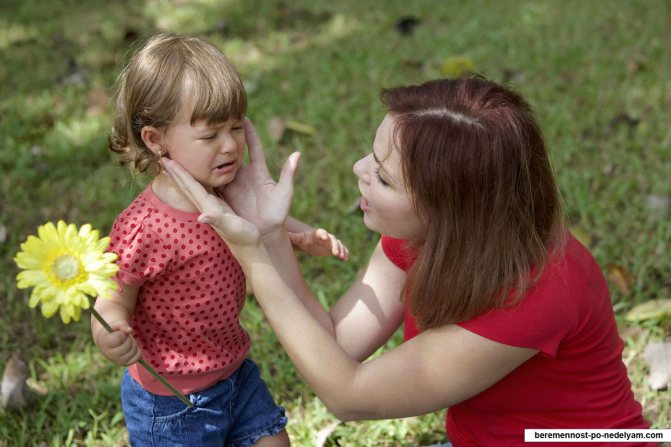What reasons make a child capricious?
From birth, a child is a blank slate and the development of his personality directly depends on the upbringing given by his parents. Any manifestations of emotions, both positive and negative, are a reflection of the internal state of the little one. The reasons why a child becomes capricious are as follows.
Physiological imbalance
At an early age, the baby is not yet aware of his feelings, so he does not always understand that the reason for his capricious mood is illness, hunger, fatigue or fever. It is the “overwhelm” of the psyche with emotions caused by a physiological imbalance in the body that becomes the cause of children’s hysterics and dejected behavior.
Family microclimate
When the baby begins to understand what is going on around and feel other people's emotions, then the reason for capricious behavior may be hidden in the information received from the outside. In other words, an unstable microclimate in the family, with constant quarrels and scandals, has a great impact on the baby. He expresses his protest with hysterics. Therefore, parents need to create an environment of love, calm and consistency. And if you really want to quarrel, then do it while the baby is away. Very often a baby becomes capricious when the family is preparing for the arrival of a new addition. To avoid conflicts in the future, it is necessary to properly prepare the older toddler for the arrival of a newborn. Read how to do this in the article “Jealousy of an older child: how to avoid it? Tips to help raise a psychologically stable personality!”
Excessive care and spoiling
Every parent wants to protect their child from all the difficulties and troubles of the outside world. We make decisions for him and protect him from the first childhood difficulties. We try to shower them with gifts, showing our love. Such actions of “blowing away specks of dust” lead to the fact that the little one does not know what independence is and is “in no hurry” to grow up. He understands that with capricious antics you can achieve whatever you want. Pampering often becomes the cause of children's tears.
Age-related changes
Psychologists say that while a child is growing up, there are periods called age crises. Usually this is three years and five years. During this period, many mothers notice drastic changes in their baby. Firstly, this happens because the child tries to assert himself in defiance of his parents; he wants more freedom and independent decisions. Secondly, the overprotection of mom and dad “stresses” him and he shows his maturity with capricious antics.
Child at 3 years old (4 years old) freaks out, cries and is naughty
Information update: 06/06/2019
Children aged 3-4 years are quite independent people: they attend kindergarten and prefer activities to their liking. Plus, they are old enough to communicate their needs. Then where do the hysterics and whims that worry parents so much come from? What should tired mothers do if a three- or four-year-old baby constantly cries and is naughty?
The age of three is a fertile time for the emotional and cognitive development of children. They gain new experience, understand more and, at the same time, experience conflicts acutely.
All these problems are superimposed by the crisis of three years, when previously docile children become whiny, capricious and obstinate, flatly refusing to comply with the demands of adults.
They often behave ugly: they stomp their feet, cry, scream, and throw objects that are within their reach.
Causes of children's tears and whims
Many parents do not understand why their child constantly cries and is capricious. And the sources of such behavior usually lie on the surface, but they cannot always be immediately recognized.
- The baby demands your attention, he lacks communication with his parents, he wants to see evidence of his own “need”. The desire for maternal love and affection is a child’s basic need.
- Being capricious, children want to get what they want , for example, a gift, sweets, permission to go for a walk - something that mothers and fathers do not allow for reasons incomprehensible to children.
- The child protests against parental dictate and excessive care, demonstrating a desire to become independent and independent. This is typical for authoritarian parenting methods. Remember how often you tell your son or daughter: “Quickly put on that sweater,” “Stop looking around.”
- Crying and whims can occur without an obvious reason. Perhaps the baby was overtired, did not get enough sleep, or watched a family quarrel. Many components influence a child’s mood, so you need to analyze them all.
Let's look at each option in more detail and find out what parents should do if a 3-4 year old child is constantly capricious and crying.
Desire to communicate
The advice is both simple and complex: if you want to avoid tears and whims, spend more time with your children. Of course, parents often do not have enough time for close and full communication with their child. But the main thing here is not the number of minutes, but their quality . There is no need to give up household chores; communicate with your child in the process of implementing them.
Organize common holidays and family gatherings more often. In addition to the traditional feast, come up with interesting entertainment and competitions for all family members. Another way is to go to a circus, an amusement park, or go out of town. There would be a desire, but there are plenty of options to have fun with your family.
Reaction to prohibitions
The baby should have the opportunity to explore the world around him. Your task is to help, and not interfere with children's curiosity. To do this, you need to set clear boundaries of what is permitted , streamline the requirements and reduce the number of prohibitions, leaving only the most important ones . They usually relate to child safety and must be followed strictly.
Make your child a helper in homework by presenting new responsibilities in a playful way. Are you preparing lunch? Invite your baby to wash vegetables or “feed” the cookie.
Do you wash your clothes? Give him a basin and offer to wash your blouse. There are several advantages to joint business ventures. Firstly, you control the actions of your child.
Secondly, you can explain to him the danger of household items.
Self-affirmation
A child of 3-4 years old begins to perceive parental care not only as a manifestation of love, but also as a suppression of independence and an annoying hindrance. At this age, children require a kind of balance of care and freedom. You don’t want to raise a “comfortable” child who causes little trouble, but doesn’t strive for achievements himself?
For example, a three-year-old behaves badly at lunch: he refuses porridge, demands other dishes, pushes away the mug of jelly. If you force him, he will continue to be capricious, and this is not far from full-fledged hysteria. Accept that he is now an independent person and has the right to choose both the list of dishes and the serving size. Believe me, he will definitely not die of hunger.
Read also Thanks to my stork! Adoption: psychological problems.
Implicit reasons for whims
Children are born with different types of nervous systems. “Stronger” babies are resistant to irritants and do not cry over every little thing. A child with an unstable nervous system is vulnerable; his reaction to troubles and difficulties is too emotional.
In such children, minor pain causes hysterics, a lump in the porridge leads to vomiting, and too many impressions during the day deprive them of sleep. Whims and tears are a constant companion for three- and four-year-old melancholics. Parents should prevent the occurrence of hysterics, and in case of prolonged stress, they should seek advice from a neurologist or psychologist.
What to do?
If a 3-4 year old child is constantly naughty, analyze all the above reasons and try to eliminate them. Try to prevent the occurrence of stressful situations.
If whining does start, try to switch your baby’s interest to something else.
“Look what huge tears are pouring from your eyes. Let’s put them in a jar,” says one inventive mom.
Offer your little one a new subject or an interesting activity: watch together or read your favorite book. Communicating together will help him feel your love and eliminate unconstructive ways of attracting parental attention.
A 3-year-old child often freaks out and is capricious - Advice from Dr. Komarovsky
Source: https://MameNaZametku.ru/materinstvo/psihologia/rebenok-v-3-4-goda-postoyanno-plachet-i-kapriznichaet-chto-delat
How do whims manifest themselves depending on age?
The manifestation of his whims depends on the age of the child. According to psychologists, each age should have its own approach to a child and age-related changes must be taken into account in education.
Let's try to figure out how whims manifest themselves depending on the age of the baby.
1. Children under one year old. A child of this age attracts attention by crying. Such crying cannot be called whims, since he does not yet know how to speak, but calls “for help” by screaming when he is hungry, something hurts, or his diaper is wet. When negative factors are eliminated, the baby calms down and stops crying. For more information about the needs of children in the first year of life, read the article “Komarovsky: children under one year of age.”
2. Children from one to two years old. After a year, the baby understands perfectly well that all he has to do is cry, and his mother will immediately fulfill his every wish. The concept of “no” does not yet exist for a child, and each refusal leads to another cry. This behavior is provoked by parents who, under the “pressure” of the child’s hysterics, allow them to do today what was impossible yesterday.
3. Children from two to three years old. This age still allows you to prevent whims by switching your attention to something else. Being distracted, the baby forgets why he cried. Also, we already have our own foundations and there is an awareness of what is possible and what is not. As a reward for obedience, you can buy your child a toy, and the article will help you choose the right one: “TOP 10 useful toys for children aged 2 to 5 years.”
4. Children after three years. The child’s character has already been formed and self-esteem appears. At three years old, it is slightly overestimated, because before that the whole world revolved around him. It is at this age that the crisis of three years (crisis of age) occurs. Very often, conflict situations between a child and parents or between him and peers in kindergarten cause whims (falling on the floor, throwing something), which force parents to seriously think about what to do with their child. You can read how to prepare your baby for the society that awaits him in kindergarten in the article: “How to prepare your baby for life in kindergarten?”
5. Children after five years of age. Now crying, screaming and stamping your feet are “weapons” against parents that work great in public places. He skillfully uses such methods of influence and achieves his goal. Screaming and physical force will not get rid of such manifestations; a subtle approach is needed here. You can use the “puzzle the cub” technique and purchase a pet that he will need to look after. If you choose this method, the article will help you: “What kind of dog to give to a child.”

Why a child may be capricious, reasons and what to do, advice from psychologists
There are many reasons why a child may be capricious. In each case, it is necessary to deal with the problem in order to avoid serious consequences in behavioral, psychological and physical development. Unfavorable factors that can lead to whims include improper upbringing, health problems, poor family climate, and age-related changes.
Why is the baby naughty?
The appearance of a child in a family is a great joy. Parents have new worries and new responsibilities. If the baby is capricious and cries, then the condition completely unsettles the parents.
In the first months after birth, crying in most cases is caused by imperfections in the nervous and digestive systems.
By three months, the causeless crying goes away, and parents already recognize the reason.
Whims in the evening and at night
When a baby cannot fall asleep in the evenings, and the parents know for sure that he is full and is not bothered by gas, the reason is due to overexcitation. The baby becomes hysterical and falls asleep only closer to midnight. Perhaps we walked a lot during the day and met new people. Having screamed enough, the child falls asleep. Some babies need to be rocked in your arms.
Causes of whims and methods of dealing with them
If the cause of the whims is related to illness, then it is necessary to call a doctor at home. He will prescribe the correct treatment. You cannot give any medications on your own. Otherwise, the cause is easily eliminated. You need to either change a wet diaper, feed him milk, put him to bed or give him something to drink.
Physiological imbalance
In infancy, a child cannot yet explain his desires and is not fully aware of his feelings. The result is a physiological imbalance. The baby begins to cry and be capricious due to hunger, thirst, illness, or poor sleep.
Improper sleep patterns
The lack of a constant routine causes disturbances in the child’s behavior. Therefore, parents should make adjustments to their daily routine:
- A newborn baby sleeps up to 18 hours a day. The duration of night and daytime sleep does not exceed 3-4 hours. The waking time should not exceed two hours. If you miss this time, it will be difficult to put the baby to sleep. During night awakenings, you do not need to turn on the light, play or talk to your baby for a long time.
- By three months, sleep duration decreases to 14-15 hours. During the day, the baby should go to bed twice. If he does not sleep during the day, or sleep duration is no more than 35 minutes, you should consult a doctor.
- If the baby sleeps little at night, the reason may be due to dry air in the room, uncomfortable clothes, or bright daytime emotions. A baby may have trouble sleeping due to a cold or teething.
When a child wants to sleep, he yawns and rubs his eyes with his fists. If parents notice that the child wants to sleep, but does not fall asleep, they need to help him. You can give a massage, rock him in your arms, sing a lullaby.
Thirst
From birth, the baby should be given plain water to drink, especially if he is formula-fed. If the room is hot and the air is dry, then the amount of liquid should be increased.
Hunger
You can understand that a baby is capricious due to hunger by the following signs:
- crying appears immediately after feeding;
- whims after a short period of time after the next portion of milk;
- daytime sleep became short;
- greedily begins to suck on the breast or bottle.
If other signs appear, then the cause may be related to other factors.
Family microclimate
A child is negatively affected by a bad atmosphere in the family. Quarrels and conflicts between parents lead to hysterics and bad behavior.
Parents need to sort things out when the child is not in the room. He needs to be raised in love, calm, affection and understanding.
Excessive care and spoiling
You shouldn’t do everything for your baby right from infancy. He should be given the opportunity to act independently in some situations. Excessive attentiveness, frequent gifts, and the desire to protect the baby from troubles negatively affect his behavioral sphere. The baby gets used to achieving everything with tears and hysterics.
Age-related changes
As a child grows up, there are several periods of crisis. During crisis stages, changes occur in the psychological and physiological state. At this time, the child is capricious a lot, wants to do everything the opposite, in defiance of his parents, wants to declare his adulthood.
Medical Causes of Sleep Disorders
Medical causes of sleep disorders in children include:
- neurological diseases (neuroses, hyperactivity);
- somatic disorders (rickets, liver or kidney pathology).
In all these cases, the help of specialists is necessary. In most cases, it cannot be done without the use of medications.
Other reasons
The task of parents is to clarify the cause of whims and crying in the baby as early as possible. Sometimes the condition indicates a disease. In the latter case, other symptoms appear (rash on the body, fever, cough, change in stool).
Colic in a newborn
The accumulation of gases in the intestines is accompanied by sharp, unpleasant pain, so the baby begins to cry. The phenomenon is most troubling in the first months of life. Additional symptoms are:
- baby is pushing;
- twitches his legs and presses them to his tummy;
- clenches his fingers into a fist;
- blushes.
If the baby is breastfed, colic often occurs due to the foods that the mother ate. A nursing woman should strictly monitor her diet and not eat prohibited foods.
Crying after vaccination
Many children's behavior changes after vaccination and their condition worsens. After vaccination against hepatitis B, the child feels unwell, dizzy and has a headache, he may feel sick, his body temperature rises, and indigestion occurs.
The trip to the hospital and the injection itself is stressful for the baby. In response to all these phenomena, the baby becomes capricious, screams and cries, sleeps and eats poorly.
Therefore, doctors recommend giving antipyretic, anti-inflammatory, and painkillers in the first days after vaccination.
After DTP vaccination, the body temperature rises, the functioning of the digestive organs is disrupted, and a cough and runny nose may appear. Often the development of allergic manifestations.
On the day of vaccination, the child should be given a remedy for fever and pain, as well as allergies. These days, it is recommended to put the baby to the breast as often as possible. The BCG vaccination is accompanied by unpleasant symptoms, against the background of which the baby becomes capricious and whiny. Sleep is disturbed and appetite disappears.
On vaccination days, you need to pay as much attention to the child as possible. Young children do not understand the reason for their poor health, so the parents’ task is to give medicine and provide a calm atmosphere.
Change of weather
Experts say that weather conditions negatively affect the condition of some children from birth. Bad influence:
- sudden change in temperature;
- increase in atmospheric pressure;
- wind;
- increased air humidity;
- magnetic storms.
Those most susceptible to the effects of the weather are children born prematurely, those who have recently undergone surgery, and those who have problems with the functioning of their internal organs.
A few days before the weather changes, the baby changes in behavior. He may be capricious all day, sleep is disturbed, and appetite decreases. Parents should tell their doctor about this. As a preventative measure, massage, physiotherapeutic procedures, acupuncture, and exercise therapy can be prescribed.
How do whims manifest themselves depending on age?
It is important for parents to take into account age-related changes and crisis stages in the process of education. Only in this case can you avoid conflicts with your child and prevent the appearance of whims.
Infants
Children under one year old require special attention. Whims and crying can indicate discomfort and illness, so behavior cannot be ignored.
Why are babies capricious at 1 month? A one-month-old baby is capricious and crying due to hunger, fever, and wet diaper. As soon as the discomfort is eliminated, the baby becomes calm and cheerful.
At 2 months, the baby cries due to discomfort (wet diaper, uncomfortable clothes, hot air, change of weather), lack of attention and communication, fatigue or pain.
All of the above reasons can cause anxiety in the behavior of a 4 and 5 month old baby. An additional factor is teething. At 8 months, the child begins to actively explore the world around him. The appearance of new people, prohibitions, improper daily routine, little attention - all this negatively affects the child’s behavioral sphere.
Baby is naughty before bed
If a two-month-old baby is periodically capricious before bed, the reasons may be associated with intense emotions and pain. Emotional overload.
Not only negative, but also positive emotions excite the baby’s nervous system. Two hours before bedtime, active games and watching TV should be avoided.
It is useful to bathe your baby in water, listen to calm music, and read a book. The same reason can lead to changes in the behavior of a child older than 6 months.
Wrong daily routine. From the age of 3 months, your baby should be taught to get up and go to bed at the same time. Accustoming needs to begin, as closer to 7 months it will be more difficult to do.
Parents sound the alarm when the baby suddenly suddenly becomes capricious when rocked. This usually happens to infants over 10 months of age.
Older babies no longer need to be rocked to sleep; they can simply be put into bed.
During feeding
When a baby cries or whines during feeding, the condition may indicate a disease (otitis media, stomatitis, sore throat).
If your baby is crying and fussing at the breast, there may be not enough milk, a strong milk flow, or an unpleasant taste in the milk.
Whims in one year
At 1.5 years old, whims and crying appear in response to prohibitions and refusal. Parents need to be consistent and constant in their demands.
Two years
Children already understand what is possible and what is not. It is easier for them to explain the reason for the ban. In case of whims, it is easy to switch the child’s attention to another object or event.
Crisis of three years
By the age of three, the social circle of friends expands. At this age, many children are sent to kindergarten. Conflicts between peers and parents often become the cause of whims and hysterics.
How to calm a baby?
How to cope with whims? The following tips will help:
- pick it up and press it to your stomach;
- get a massage;
- distract attention with a ringing bright object or a loud voice;
- turn on a pleasant melody;
- changing hands helps, for example, the baby can be given to grandma or dad;
- Toys and mobile phones are distracting.
What to do if a child cries? A walk outside will help. How to respond to a child's bad behavior? You cannot raise your voice in response to whims and crying. You should remain calm and try to redirect the baby’s attention.
Prevention of capricious behavior in children
How to wean a child from whims? Psychologists advise following some rules:
- There is no need to suppress the child’s independence and perform simple actions for him (buttoning a jacket, putting away toys).
- It is important to control your emotions in response to your baby's tantrum. You need to be calm, self-possessed, and under no circumstances should you shout back. It is better to ignore the moment of whim, and then calmly explain the behavior.
- Blackmail tactics should not be used in education. For example: “If you don’t put away your toys, you won’t go for a walk.” This behavior provokes a response in older age: “If you scold me for bad grades, I won’t come home.”
- It is important to be consistent and faithful in your chosen behavior tactics. You cannot solve a problem one way today and another tomorrow. If a decision has been made to refuse something, then this should become the rule.
There is no point in reproaching your child for bad behavior. You need to explain to him that the action upset him, but this is not a reason not to love him.
When you need specialist help
If your child is often capricious for no reason, you should consult a specialist. Problems begin to be solved by visiting a pediatrician and neurologist. A child may cry and be capricious all the time due to diseases of the internal organs, so the help of other specialized specialists will be required.
Source: https://grudnichky.ru/razvitie/pochemu-rebenok-kapriznichaet.html
Why do whims arise?
Almost all parents daily encounter their child’s reluctance to sleep, eat, get dressed, return from a walk or go to kindergarten. The child begins to cry, refuses to do what he’s supposed to do, and sometimes just whines or screams. There are several main reasons for this behavior:
- The group of physical reasons includes fatigue, thirst, hunger, desire to sleep and any disease. The baby feels “out of place”, not understanding the reasons that caused this condition. To eliminate many of these reasons, parents just need to strictly follow the baby’s daily routine - give him water and food on time, put him to bed.
- The need for attention - if you communicate with your baby more often, then most of the tantrums can be avoided. Mom’s love for a baby is like a breath of fresh air. Without receiving the required amount of attention, the baby himself will begin to draw it out in every possible way. It’s better not to wait for the baby to start hysterics, but to put aside your business for a while, turn off the Internet, turn off the phone and just hug him. It's even better to spend some time with him, play, talk about something.
- The thirst to achieve what you want. The little sly one notices the weak points of his parents and looks for ways to put pressure on them. If parents try to pay off the child’s whims with gifts, then the child instantly catches on to the scheme that is beneficial for himself. Therefore, it is more important to teach him to negotiate with others and look for other solutions to his problems.
Nature itself arranges it in such a way that in adults, a child’s cry immediately evokes a strong emotional reaction. This is a necessity, since such reflection can save the health and life of the baby. But if he cries all the time, then you should figure out what is causing it.
The whims of infants
Parents remember the first 3-4 months of a baby’s life with a shudder. It is at this time that children usually cry and are capricious. The reasons for this may be various circumstances.
- The baby is constantly hungry if the mother has insufficient lactation or does not accept artificial formula well. If this is reflected in his weight gain, the doctor may recommend additional nutrition.
- Gases in the intestines causing colic. A nursing mother should follow a proper diet, avoiding foods rich in fiber. The doctor may prescribe drops for the child himself to normalize the functioning of the gastrointestinal tract.
- If you have an ear infection or a cold, you should consult a doctor , to whom the mother should tell about changes in the child’s behavior.
- Most children do not like wet diapers and react strongly to them. Therefore, they need to be changed on time or use diapers.
- Babies often experience a feeling of loneliness, but when picked up, they quickly calm down.
It is difficult for young and inexperienced parents to understand the reason for a child's crying. They need to learn to listen to the baby and quickly eliminate the causes of his dissatisfaction.
The whims of one-year-old babies
At the age of one year, babies encounter the first prohibitions and can react to them quite violently: stomping their feet, throwing objects, screaming loudly. Parents who are aware of such age-related characteristics will try to prevent such aggressive behavior in their offspring. One-year-old babies can also be capricious for various reasons that parents need to determine:
Young mothers would be greatly helped by time management, which actually means a daily routine - the ability to properly distribute their time. With the help of simple steps.
- The cause of the whim may be an internal conflict or illness - the baby does not understand why he feels bad, but signals this in an accessible way - by crying.
- The protest against excessive guardianship is aimed at the desire for greater freedom when he does not want to return home from a walk or wear the clothes offered.
- The desire to imitate parents should be supported by allowing the child to participate in everyday activities. Thanks to this, the child can always be kept under supervision and gradually taught how to handle new objects.
- The baby can react to strong expressions of emotion, so tight control or excessive severity can drive him to hysterics. The baby must be treated as an equal person, without expecting him to unquestioningly carry out his will.
The whims of children at 2 years old
This age is difficult because even docile toddlers become tyrants, whose demands and whims parents cannot cope with. Many children experience increased excitability and sleep problems, which can lead to hysterics. In two-year-old children, the following reasons can be identified that most often cause whims.
- The socialization of the baby begins precisely at this age , when he has to learn the rules of interaction and communication with other people that are unusual for him. The child may sharply resist new restrictions regarding his freedom of action and independence.
- Although at this age the baby begins to master speech , he is not yet able to convey his feelings and intentions in words. In this case, by crying and screaming, he relieves himself of nervous tension.
- Energy unspent during the day can lead to insomnia and whims in the evening, so during the day the baby should be allowed to actively play and move.
- the emotional state of adults very well, having a hard time enduring family quarrels and scandals.
Since at 2 years old the baby enters a crisis phase, his problems need to be responded to correctly.
Crisis of the eighth month (from the 32nd to the 38th week)
The baby begins to understand speech, becomes more emotional, hears and sees objects better, observes more what is happening around him, and wants to try new foods. What can you notice in his behavior?
- Cry.
- Apathy.
- Some children want to be more affectionate: they hug and ask to be kissed more often, they want to be closer to their mother.
- They start to feel shy.
- The child seems to go back in his behavior and become “like a little one.”
- Protest while changing clothes.
- Taste preferences change.
What to do with a constantly naughty baby?
Each parent solves this problem in their own way. But not all methods give positive results, and sometimes they only worsen the situation. Here's what to do in this case:
- Calm down yourself and under no circumstances put pressure or yell at the little one . It’s better to leave him alone for a while, and then talk to him kindly.
- You can visit a children's center , where the child could learn to communicate with peers in a safe environment.
- If you pay enough attention to your baby , 90% of the reasons for hysterics will disappear.
Crisis of the first year (usually begins from the 49th to 56th week)
The baby is getting better at moving around - he has learned to crawl, and maybe even walk, and is becoming more independent. At the same time, the baby’s nervous system does not have time to process a large flow of new information.
Signs of this age leap:
- The baby practically hangs on his mother, clinging to clothes. Requires more physical contact.
- Jealousy when mom pays attention to someone else besides him.
- Disobedience.
- The mood changes sharply.
When should you see a doctor?
The norm, according to experts, is for the child to show his dissatisfaction 2-3 times a week. But if he is capricious regularly, and sometimes throws outright tantrums, then he should be shown to a specialist. Sometimes just a few visits to a child psychologist are enough to restore peace and tranquility in the family. All parents should accept the whims of children at an early age as a completely normal phenomenon. You just need to learn how to correctly identify their causes and eliminate them in a timely manner.
Coup crisis
It is associated with the first major motor skill - the child learns to roll over from his back to his tummy and a little later - back. This occurs in different babies between 3 and 6 months (approximately 14 to 25 weeks). Such a serious breakthrough in physical development also affects emotional development: the baby already understands that there are objects in the world that exist on their own, and not just when they are taken or touched.
The main features of this crisis period:
- Loses interest in everything.
- Appetite worsens.
- Sudden change of mood.
- Requires constant presence of mother.
Stubborn age
A capricious child shows his first protests at 2-3 years old; this is an important emotional development. Psychologists call this time the “three-year crisis.” Children 3-4 years old try to separate their own “I” from their mother. The speech of a three-year-old is not yet developed, so kids use other ways to show emotions and stubbornness: screaming, crying, falling on the floor and damaging property. Hysterics become more frequent. This is the best time to rebuild the system of relationships in the family and adjust parenting methods.
Only by the age of 4 do children realize their independence, have favorite activities and food preferences. Kids are already quite independent individuals. Most of them attend kindergarten and use speech to formulate their desires. Children of this age are much less likely to be capricious. Outbursts of stubbornness are more likely to be a copying of the family behavior model. That is why you should not swear in front of children, and even more so do not include children in adult conflicts. A capricious four-year-old child should already alert his parents; frequent hysterics are a reason to visit a neurologist and child psychologist.
Crisis “Mom, don’t go!” (from 9 months, approximately 40 to 47 weeks)
A new physical skill - crawling - changes the baby's ideas about the world around him, now he sees it differently, from a more elevated position. The overabundance of information received in this way changes the child’s way of thinking. All this provokes another growth spurt, which can manifest itself as follows:
- The baby may cry a lot as soon as the mother leaves the room.
- Shyness, especially in front of others.
- Begins to find fault with complementary foods.
- Jealousy appears.
- Needs a lot of attention from mom.
Why does “I don’t want” appear?
The grandmother’s tantrums of a small child are best explained: “Why is your child being capricious again? You’ve been spoiled, so now he’s playing with you as he wants!” Some parents really follow their child’s lead in order to keep up with modern ri or “Wear whatever you want, just don’t cry!” In such situations, the child quickly understands that with hysteria and stubbornness he can get his parents to fulfill his desires. To solve the problem of whims, it is important to understand their true cause. Sometimes parents mistake the child’s reaction to excessive parental demands as whims. Often the child really does not know how to fulfill this or that parent’s requirement.
Standard reasons
Why do we so often encounter whims? There are several visible causes of tantrums in children:
- Testing parents' strength. The baby's first tantrums frighten mom and dad. By repeating them over and over again, the baby, according to all the laws of psychology, checks the reaction of the parents and determines the boundaries of what is permitted: how will mom react if she turns over a plate of soup, what will happen if she bites dad in anger? Hysterics are a way to test the authority of elders and how serious parental prohibitions are.
- Fear of innovation. Sensitive and emotional children require a special approach. Such children are afraid of everything new. A new dish, or “moving” to your crib may be accompanied by tears and categorical denial. A capricious two-year-old child does not agree to go to a new playground - promise that you will be next to him and play in the sandbox together. Feeling safe, the baby will definitely compromise.
- Usual refusal. Occurs at older ages. Over the first few years of life, parents are accustomed to deciding absolutely everything for the baby: what to wear, what to eat, when to go to bed. At the age of four, a child can already determine whether he likes this or that outfit or dish, and what he doesn’t like at all. If the opinions of the baby and the mother do not coincide, a protest may arise. Perhaps it's time to listen to your child on some issues?
Consequences of education
- The result of overprotection. Some parents strive to protect their child from various life problems: mothers and grandmothers spoon-feed their child for a long time, and only use a stroller for walks. Attempts to encourage such a child to be independent are met with protest. In this case, the whims of a small child are associated with the fact that he does not understand why the mother does not fulfill her “direct responsibilities” - she stopped feeding the little one and dressing him.
- An attempt to attract attention. By the age of two, children already understand perfectly well what needs to be done to attract parental attention. If adults every time feel sorry for the baby after hysterics, then soon stamping feet and screaming will become frequent guests in this house. A capricious two-year-old child understands perfectly well that with his behavior he instantly attracts the attention of adults.
For some children, hysterics are the best way to attract attention to themselves.
How to deal with whims?
Overcoming the whims of a small child can be difficult. This is especially obvious when the mother is in a hurry, and the baby is still busy with something and is not going to go anywhere. The child, seeing irritation, will be even more stubborn. In most cases, the conflict ends in favor of the adults, and the child, through tears and nerves, still gets ready and follows his mother. If such situations are repeated, it is time to change the rules of communication in the family and teach the child to express his emotions in a more effective and adult way - with words. The most important thing in overcoming whims is parental self-control. Don't raise your voice, this will only intensify the rebellion. Try not to be nervous so as not to show your son or daughter your helplessness. If you want to calm down faster, think about how courageous and determined your baby has become. He defends his opinion and is already arguing with an adult.
Advice from psychologists
There are several rules that will help you cope with such a difficult transitional age. Tips to help “unwilling” mothers deal with outbursts of stubbornness:
- Check your requirements for the baby; perhaps some requests are really too high. Maybe the baby is already able to decide which sweater to wear outside, or he really doesn’t like tomato juice.
- It is necessary to develop a clear system of prohibitions. For the first time, 4-5 strict “no’s” are enough. For example, you cannot approach street dogs or a lit stove, as well as other age-appropriate prohibitions. The rules are not violated under any pretext. These “don’ts” must be confirmed by all family members, including grandparents.
- It is difficult for a child to follow parental instructions every day: to prevent the child from rebelling, offer him options: “Which toy should we take for a walk, an elephant or a car?” Ask your child for advice and he will be happy to compromise.
- Develop independence in children. You should not do for your child what he can do himself. Instead of dressing your child, instruct him to put on his own pants. It is better to go for a walk 15 minutes later, but let the baby dress himself.
- Don't react to your child's whims. The best way to overcome a tantrum is to ignore it. At home, you can leave your child in the room and do other things. Without increased attention, the baby will calm down much faster. If a tantrum catches you among people, you need to try to find a secluded place away from the annoying environment as quickly as possible, then switch the baby’s attention to something more interesting.
- Analyze the situation. Every outburst of stubbornness is an unfulfilled need of the baby. At such a young age, children cannot want something bad. Maybe a capricious baby simply lacks attention or communication - adults should think about this.
- Praise your child for behavior that you like. Praise sincerely, describing all the good things the baby has done.
How to stop a child from whining?
A whining, capricious and hysterical child is every parent’s worst nightmare.
He drives you crazy at home, puts on performances on the street, and if you take him to the store with you and refuse to buy what he wants, expect a grandiose performance with hypertrophied resentment, hard-won tears, or perhaps even falling to the floor and convulsive kicking, during which you will be seriously afraid that the baby will hurt his head.
It cannot be said that a whining child who is capricious for any reason is such a rare problem. Probably, almost all parents encounter it; the difference lies only in the severity and duration of its manifestation.
It is quite possible to solve this problem, but, oddly enough, not in the most widely known ways: not with spanking, not with scolding, and certainly not with phrases like: “If you don’t stop, I’ll go home alone and leave you here!” or “If you don’t calm down, that aunt over there will punish you!”
Let's try to figure everything out in order.
Why do children whine and be capricious?
There may be several main deep reasons for this behavior:
- The child lacks attention. Yes, it's corny, but it's true. How often do you spend time with your baby? How attentive are you to what he tells you, what he does, clearly expecting your approval, what he asks? Are you distracted by work, by the phone, by conversations with adults, or by sending your child away with the words “don’t bother me, I’m busy right now”? After all, if the baby experiences a lack of your attention and immediate care (and not earning money for his distant future), then he will inevitably begin to achieve this through whims.
- The child is in pain. The options may be different: teeth are cutting, the tummy is swollen, the temperature rises, and so on. Young children are not yet able to clearly identify such sensations and verbalize them (even if they can already talk). They simply feel bad, uncomfortable, and because of this they begin to whine or become hysterical. Therefore, if your child’s whims are accompanied by his painful (or simply different from usual) appearance, just in case, find out if the baby has something “bo-bo”, and do not aggravate the situation by shouting and swearing.
- The baby is trying to show his individuality. You must understand that for a child, even a small one (especially starting from 2-3 years of age), it is absolutely natural to begin to realize himself as an individual and strive to realize it. Yes, in early childhood it looks quite cute and funny: the baby wants to choose what toy to play with, what to wear and how to eat. But this is truly important, and you should not interfere with this, nor should you create an atmosphere in the family in which your word will be considered law, and any word of the child that does not correspond to it will be considered heresy. Indeed, in this case, it will be obvious that the child will become hysterical for every reason because of the desire for independence that you suppress.
- The child wants to get something that you deny him for reasons unknown to him. As a child, it’s difficult to understand why you can’t have that beautiful shiny toy over there, go visit Aunt Masha right now, or eat five chocolates for lunch. You understand that the toy is expensive, that showing up at Aunt Masha’s without an invitation is impolite, and so many sweets will make your stomach and teeth hurt. For a child, this logic does not work, and in order to understand it, he must hear a patient and intelligible explanation of all cause-and-effect relationships more than once.
- The child feels bad not in a physical, but in a psychological context. Surely you have days when you feel sad for no reason, or when you are irritated by everything, or when you want to cry for any reason. A child whose psyche is in a stage of rapid development, constant changes and transformations, also has such days, and he feels them much more vividly. And, since he still does not know how to cope with “discord” with himself, does not know how to control his emotions, this state inevitably results in him constantly whining, being capricious or throwing tantrums. He just needs to get through his bad day, cope with his psychological discomfort, get rid of causeless negative experiences, and do this with minimal losses and in the most calm environment with as few irritating factors as possible.
- The baby is under emotional stress. This condition occurs especially often in the first years of life, and it manifests itself to the greatest extent in the evening. A large number of impressions collected in a day turns out to be simply excessive for the little man, which is why whims and hysterics begin. All he needs in such a situation is a good rest and sleep, after which the bad behavior will disappear.
What exactly should you not do if your child whines and is hysterical?
To stop a child from whining and being capricious, first of all, you must get rid of bad habits yourself. True, from bad habits of a slightly different kind.
So, the first of them is the inability to listen to your child. It can manifest itself in different ways: for example, in listing the possible reasons for the child’s bad behavior.
Maybe someone offended him? Or does he want something? Or does he have any pain? Be that as it may, you must understand that, firstly, you will not be able to list absolutely all possible options.
And secondly, that the child will simply choose from those proposed the one that in a given situation will be most beneficial to him, and not which will correspond to the real state of affairs.
Another version of the same mistake is simply ignoring the baby’s words.
You can simply ignore them in principle, or even object, saying something like: “Why are you deceiving me? I know better what’s going on!”
Thus, you will not only not understand what your child is currently experiencing and why he behaves this way and not otherwise, but also, in principle, you will discourage him from sharing his thoughts and experiences with you.
The second bad habit , which is inherent in a very large number of parents, is inconsistency in their own statements and actions.
For example, you tell your child that if he doesn’t calm down, you will go home and leave him on the street alone, but you, of course, never do this.
Or, going into the store, you tell your child that you won’t buy him new toys today, but he fusses, begs and whines, which is why you give up and still make a prohibited purchase instead of weaning him from such behavior.
In fact, there are a lot of examples that can be given. The meaning is always the same: you say one thing and do another. Because of this, the child begins to understand that with his scandals, tantrums, requests and other methods of manipulation he can get what he wants from you. In addition, in his eyes you lose authority, because you are not able to follow your own rules.
The third bad habit , which is also worth paying attention to, is the struggle between relatives over the choice of parenting style for the baby.
A common situation in our country is when a mother raises a child in one way, a father in another, grandparents in a third, and so on. And all these teachers constantly pull the blanket over themselves, as if they are competing with each other, not wanting to give in.
And the poor child, constantly receiving conflicting instructions, as a result cannot adapt normally to any style.
You must always remember that raising children is not a sport. This is serious and painstaking work, for the successful implementation of which everyone must unite.
Yes, it is quite difficult to seek compromises, defend your point of view to grandparents and ensure that the concept of how all close relatives treat the baby is more or less the same.
But this is a very important stage that you should not be too lazy to go through.
And finally, the fourth habit , which is perhaps the most important thing to wean yourself from. This is a conscious or subconscious desire to take it out on the child, throw out your negative emotions on him, reluctance to understand the situation due to fatigue, etc.
Sometimes it’s hard for all of us, and often the desire to simply shout at the baby overpowers the willingness to understand and listen to him. But you are an adult, a much more experienced and wise person, so as not to allow yourself to do such things.
Save your energy on something else rather than interacting with your child.
What can I do to make my child stop whining?
Frankly speaking, if you get rid of all the bad habits listed above, then it is quite possible that you will no longer need to wean your child from whining. In any case, he will definitely stop being capricious and hysterical all the time. But if the problem still persists, to one degree or another, then you can use the following tips:
- Always look for the real reason why your child is always whining. Look for it painstakingly and deeply, and not only in the baby’s words, because he may well not talk about his real desires and needs. Keep in mind that the logic of a small child is sometimes absurd for adults, but that does not cease to be logic for him.
- Never be afraid or lazy to clearly explain to your child the reasons for your actions, the goals of your actions, as well as the features and consequences of his own actions. Moreover, your explanations should concern not only the material sphere (“If you drop your fork, it will become dirty, and you won’t be able to eat with it”), but also the sensual, emotional (“I understand that you want to handle your hands, but I’m very tired. Maybe you will take pity on me and walk a little more with your legs? I will be very grateful to you").
- Look for the golden mean between lack of attention and its excess. If you have a child, then you must be prepared to spend a lot of time and effort on him. But, at the same time, you shouldn’t turn him into the center of the Universe, run around him 24 hours a day and fulfill his every whim. After all, both of these extremes often provoke whining and capriciousness in children.
- Don't stop your child from asserting himself. Allow him to make his own decisions in those areas of life where this cannot negatively affect his health or well-being. There is no need to “know better than him what he needs” in everything and always. Wean yourself away from the Almighty complex for your baby, respect his personality from an early age.
- Maintain calm and composure. Yes, it can be difficult when a child whines endlessly, but raising children is, in principle, not the easiest task. Remember that as soon as you start responding to a baby’s tantrum with a tantrum, you lose this round. There is no question of any constructive solution to the problem, or any possibility of weaning a child from whining if you start screaming, swearing and slapping him on the butt.
- Learn to properly distract your baby's attention. If a tantrum has already occurred, and if you need to somehow cope with it here and now, you can use a proven method: switch the child’s attention to some interesting thing, to his favorite toy, you can accompany this with a short funny rhyme or song. However, you must understand that this is not a way to wean a child from whining - this is precisely a way to smooth out, soften a specific hysteria. You won’t achieve success with them alone; you need to fight the problem more deeply and comprehensively.
We hope that this article will help you better understand your baby, wean him from whining and establish a closer, warmer and more trusting relationship with him. Love yourself and your children, and be happy!
Related Posts
Source: https://mamsy.ru/blog/kak-otuchit-rebenka-nyt/
Evening whims
If a child is capricious and cries in the evening, or hysterics begin before going to bed, this indicates that the baby is emotionally overexcited. Emotions accumulated during the day do not allow you to quickly relax and fall asleep. This especially applies to hyperactive and excitable children. Often evening tears occur in children who refuse daytime sleep. To avoid evening whims, you can adhere to the following recommendations:
- Be sure to go for walks together during the day. Evening walks (1-1.5 hours before bedtime) have a beneficial effect on sleep.
- Ventilate your child's room before going to bed. The optimal air temperature in a children's room, according to Dr. Komarovsky, is 18-22 degrees.
- Three hours before bedtime, do not allow your child to play active games: hide and seek, chase. You shouldn't watch cartoons at night.
How to outwit a capricious person?
Most parents try to stop their kids from being naughty. There are several ways to outwit and calm a little whim:
- Talk to me, buddy! When all the arguments have been exhausted, and the child is still capricious, try using a figurehead. A baby’s favorite toy is the best helper. Take a bunny or bear in your hand and speak on its behalf: “Hello, baby! You are so sad! I’m sad too, let’s go for a walk?” After a couple of sentences, the baby will begin to listen. This is the easiest way to stop the whims of a two-year-old child.
- Change the subject. If you feel that a protest is brewing and the child desperately does not want to do something, there is no need to fight, it is better to just change the subject. Ask your child who he played with on the playground, about new friends, interesting Easter cakes, remember the dog. A couple of minutes of enthusiastic conversation is enough to switch attention, and then again remember about water procedures.
A toy may act as a mother’s assistant, which will dispel the baby’s capricious mood











